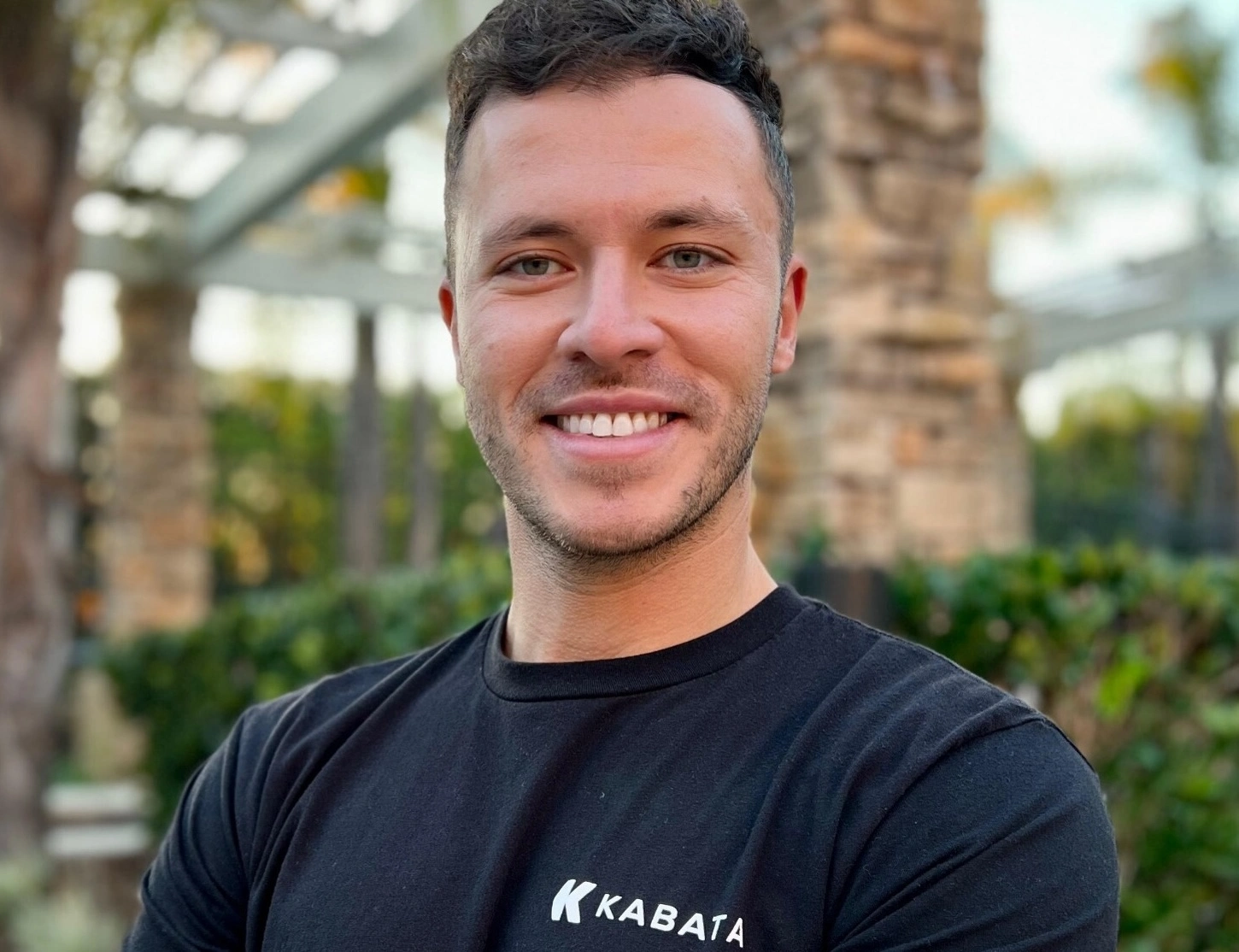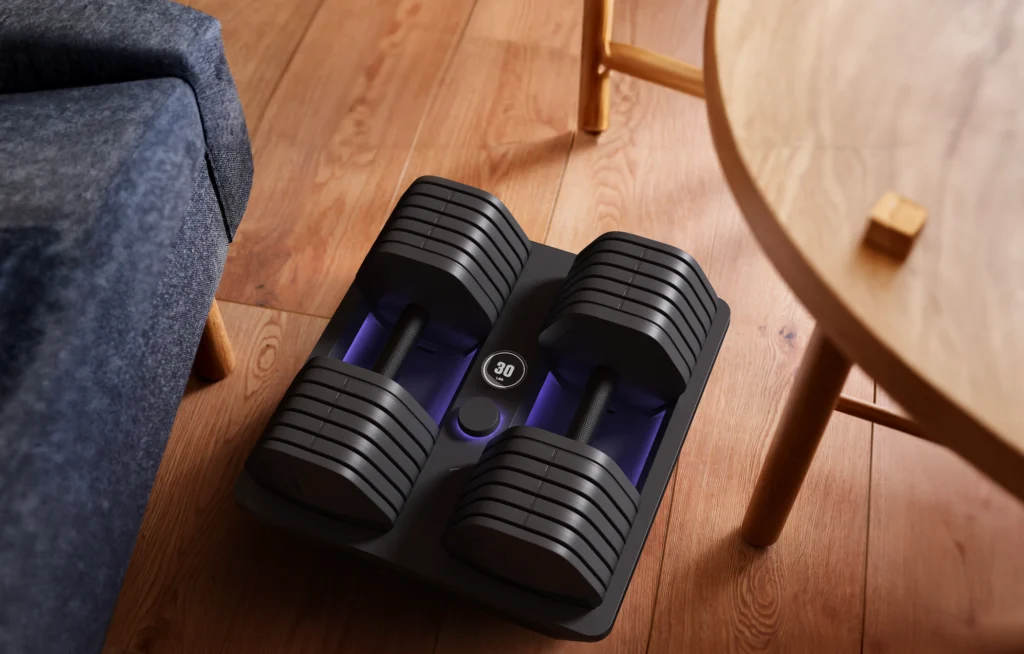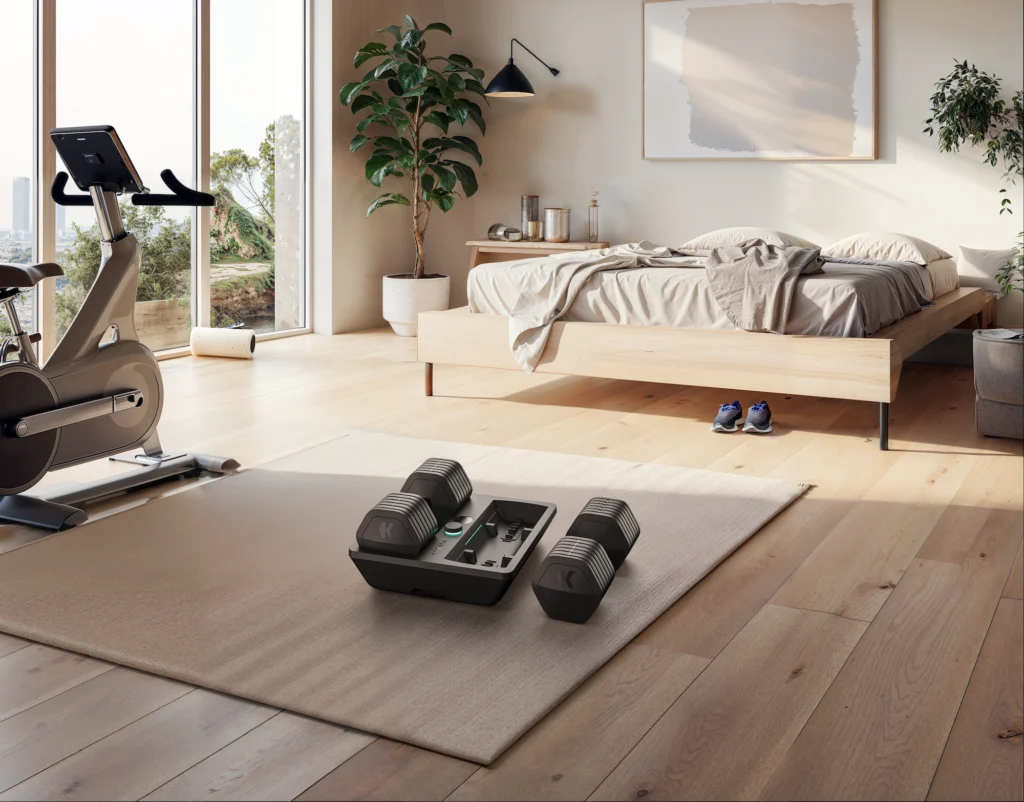CEO Corner: Kabata’s Kareem Aly on the World’s Smartest Dumbbells

Kabata dumbbells use AI to count reps and coach users in real time, innovating one of the fitness industry’s oldest pieces of equipment
Groundbreaking products in the fitness industry are rare, but every once and a while, one comes along that truly challenges the status quo.
Kabata is in the process of doing just that.
Founded by Kareem Aly and Brian Lovera in 2021, Kabata has created the world’s first AI-powered dumbbells. The smart dumbbells are adjustable from 5 to 60 lbs and use artificial intelligence to count reps, analyze form and change weight in real time.
Essentially, Kabata is aiming to transform the way people work out, turning one of the world’s oldest and most widely-used pieces of gym equipment into a high-tech product.
The brand is off to a promising start. In May. Kabata raised $5 million in a seed funding round led by Menlo Ventures and has nabbed former NBA player Zaza Pachulia and Miami Dolphins linebacker Bradley Chubb as investors.
Kabata dumbbells are now in pre-sale, expected to start shipping by the end of the year.
Ahead of the long-awaited launch. Aly spoke with Athletech News about his inspiration for creating Kabata, the challenges in building a first-of-its-kind product, and the enormous potential of AI-powered dumbbells.
The following conversation has been lightly edited for clarity and length.
Athletech News: Can you tell us about your background and why you took on the challenge of creating the world’s first AI-powered dumbbells?
Kareem Aly: I’ve always loved fitness, sports, health, and wellness – my father was a two-time national champion in field hockey and rowing, so he got us into that very early on. I’ve been strength training for the last 18 years, and I love it. I’m also a NASM-certified personal trainer, so I understand the scientifically proven benefits of strength training. But even though I love and enjoy it, I realize most people don’t.
COVID was really the catalyst (for Kabata). I couldn’t go to the gym anymore and I didn’t want a bike, a rower, or a mirror – I just wanted strength training. I was looking at the market saw and these “dumb” adjustable dumbbells on one side – everyone’s used those, but there’s no tech, app, analytics or coaching. On the other end of the spectrum, you have brands like Tonal, which are good products but are prohibitively expensive for most people.
Dumbbells are the largest TAM of any fitness modality. They’re arguably the most popular, most familiar, and most iconic piece of equipment in fitness today and historically. I thought, “What if we could make them better?”

ATN: What’s behind the Kabata name?
KA: It came about randomly – I was reading Shoe Dog, the autobiography of Phil Knight, the founder of Nike. He mentioned how Nike came to him in a dream and he basically surmised that using letters like As, Ns Bs, and Xs, in two-to-three-syllable words, was often most recognizable for companies. He referenced companies like Clorox, Kleenex, FedEx, and Nike. I was looking at Japanese words and (Kabata) came up. The K and B in Kabata are pretty recognizable, and it’s three syllables.
Kabata also has a lot of definitions and meanings across family trust, growth, community, etc. One of its more prominent meanings is “childhood friend” in Tagalog, the Filipino language. I met my co-founder and CTO, Brian, in elementary school here in Los Angeles when we were about nine years old. We grew up together, played sports together, and took all the same classes. We definitely didn’t think we’d start a company over two decades later, but in retrospect, maybe it makes sense.
ATN: What’s the process been like in bringing AI-powered dumbbells from idea to reality?
KA: It’s been drastically harder than we expected, but that’s probably what any entrepreneur would say. The weight-adjustment mechanisms, over-molding the steel to allow for smooth placement and insertion and removal of the dumbbells, getting the software to be able to perfectly rep count actual workout moves without miscounts or false positives, creating workout content and thinking about how we’re going to produce analytics in an engaging manner, all of that’s been difficult. It’s taken three and a half years, but we’re there.
We have a strong team, which I think is one of the biggest formulas. Our team members come from Apple, Nike, Whoop, Tonal, Amazon, Meta, Postmates, Stanford, UCLA, etc. We’ve been working hard and everybody’s bought in. We think we’re onto something pretty big here.

ATN: Why should people choose Kabata dumbbells over other AI-powered strength training products on the market?
KA: Most of our features are unprecedented, and they’re great for beginners and experienced athletes across the spectrum. For beginners, we offer features such as form correction, symmetry detection and range-of-motion detection. A lot of people are intimidated by strength training – they know the benefits and want to get into it – but they don’t know where to start. We adjust the weight for you and tell you exactly when to increase.
If you’re advanced, and you want the best of the best in strength training equipment, that’s exactly what Kabata is building. We have a ton of features that you won’t find in any other dumbbell, including velocity-based training, which is very bleeding-edge, primarily used by pro sports athletes.
Kabata will help prevent injury as well. Our unique and unprecedented velocity-based training mechanism will understand if your rep speed is slowing down below your typical range, and we’ll alert you that you’re fatiguing and are at a high risk of injury.
ATN: Kabata is a direct-to-consumer product, but smart dumbbells could also be appealing to gyms, sports teams, and other organizations. Are you pursuing any B2B opportunities?
KA: Obviously we want to go after the home consumer – we’d love to get Kabata in every home across America and globally. But we think the B2B side is going to be pretty big for us as well. We’re getting a lot of interest from big-box gyms, boutique gyms, hotels, apartment buildings, PT clinics, trainers, pro sports teams, universities, etc.
ATN: Earlier this year, Kabata raised $5 million in seed funding. Why was this an important milestone for the company?
KA: It’s really incredible that we have Shawn Carolan at Menlo Ventures leading the round. He’s one of the best consumer investors in Silicon Valley, bar none, having been an early investor in companies like Uber, Roku, Chime, and Siri. It’s great to have someone of his caliber believe in us.
It’s also just good to get validation from the market that people believe in what you’re building. As a founder, you’ve got to make sure there’s external validation.
ATN: Where are you in the manufacturing process? When do you hope to start shipping the dumbbells?
KA: We’re gearing up for mass production. We’ve done manufacturing runs so we’re getting pretty close. We’re expecting to ship by the end of the year.



